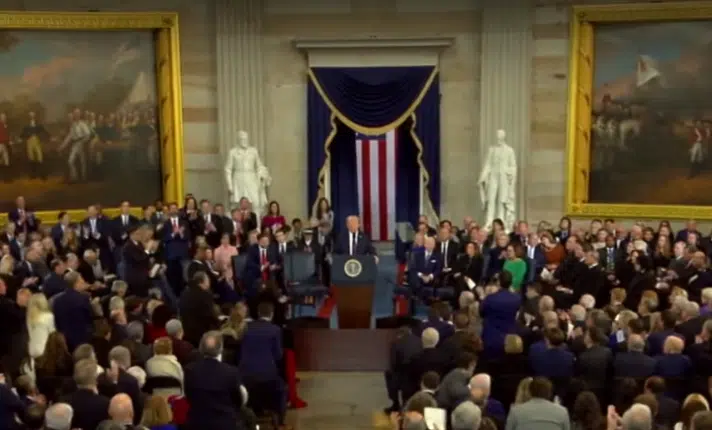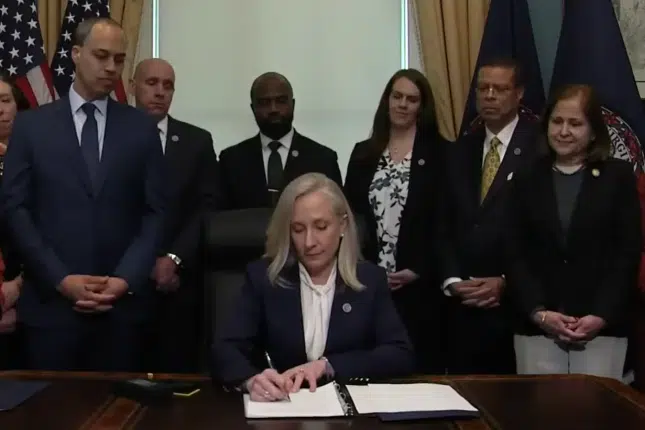They had better mean it. The House Republican Conference has unveiled its “Pledge to America,” a broad set of principles by which a new Republican majority would govern by. Included are promises to “roll back government spending to pre-stimulus, pre-bailout levels,” and to “establish strict budget caps to limit federal spending from this point forward.”
Republicans appear to have responded to and now are appealing to the tea party movement, which was founded in the wake of the unprecedented bailout regime of 2008 and 2009. Republicans propose “ending bailouts permanently, canceling the Troubled Asset Relief Program (TARP)” and to “reform Fannie Mae and Freddie Mac by ending their government takeover, shrinking their portfolios, and establishing minimum capital standards.”
That’s all very good for the American people to hear. These are some of their foremost concerns.
Some have criticized that the Pledge is not specific enough. However,in several areas it is quite specific, for example in proposing a hiring freeze for non-security federal employees, requiring sunsets for federal programs, requiring a full and honest accounting of government entitlement programs Social Security, Medicare, and Medicaid. It promises to repeal ObamaCare — in full. In its stead, it proposes allowing the purchase of health care across state lines without any government middleman exchange, tort reform, and to expand health savings accounts.
There are more specifics. On taxes, the GOP proposes making the Bush tax cuts permanent, allowing small businesses a tax deduction equal to 20 percent of their income, and the elimination of the costly ObamaCare 1099 requirement on businesses for any purchases $600 or greater.
On transparency, Republicans pledge to post legislation for 72 hours prior to being voted on. On limited government, every proposed law must cite its authorizing clause in the Federal Constitution. On fiscal responsibility, amendments will be allowed on appropriations bills, breaking the power of the appropriations committees or leadership to distribute pork.
On funding troops, Republicans will end the practice of attaching unrelated legislation and spending to troops spending bills, ending a common practice under the current House leadership. Nancy Pelosi has repeatedly attached for example states bailouts and other public sector union giveaways to war funding measures.
Other parts demand more specificity. If Republicans are truly sincere about “ending bailouts permanently,” they must specifically repeal significant portions of the recently enacted Dodd-Frank financial takeover. That bill promised to “end bailouts,” too, but everyone knows it does not.
Included in that bill is an unlimited “orderly liquidation fund” whereby the Federal Deposit Insurance Corporation can levy new assessments, or taxes, on bank holding and insurance companies to pay for the liquidation or bailout of failing financial firms.
The costs of these bailouts and government takeovers will be passed on to anybody that uses the financial system, unless Congress does something to repeal this new, dangerous authority. If Congress does not act, it will have no say in the next round of bailouts and takeovers, which will be implemented by executive fiat.
That is all law now.
Republicans must specifically act against the Dodd-Frank bill when it comes to their no more bailouts pledge, because the American people are going to hold them accountable — especially if the executive branch begins more bailouts and Republicans have done nothing to roll back the limitless authorities included in Dodd-Frank.
The end of the government ownership of Fannie Mae and Freddie Mac does help, however. The Pledge falls short of calling for the outright liquidation of the insolvent firms, and hints that they will be allowed to exist in some form. If they were solvent and privately-owned and explicitly prohibited from receiving any taxpayer subsidy ever again, there could be some assurance that the “implicit guarantee” never again is used to reinflate a new housing bubble.
But again, that demands specificity.
Most of all, on spending, Republicans need to be preparing a long-term budget that proposes spending at least ten years out. The Pledge calls for the discretionary spending to be cut to 2008 levels, citing at least $100 billion in savings annually, “putting us on a path to begin paying down the debt [and] balancing the budget”.
That sounds nice, but only cutting $1 trillion over ten years will not allow the U.S. to begin paying off the debt, and will not prevent worse things from happening. Taking the $100 billion a year number for granted, $800 billion in savings by 2018 may not prevent the U.S. credit rating from being downgraded in the near future. Why?
Because the nation’s Triple-A credit rating is not a function of spending alone. It is a function of revenue-to-interest owed on the national debt.
Moody’s has warned that when interest owed reaches 18 to 20 percent of revenue, the nation would be in line for a downgrade. By 2018, the Congressional Budget Office (CBO) reports that the U.S. will reach that level. So, cutting $100 billion annually will not prevent interest owed on the debt from skyrocketing over the next ten years, as it is set to do.
Therefore, the only way to prevent the downgrade from happening is to reduce the interest owed either by paying off a significant percentage of the principal owed on the debt, or rapidly growing the economy such that revenues rebound and outpace the growth of the interest owed.
Unfortunately, according to the CBO, interest owed on the debt will rise from $244 billion in 2011 to $755 billion in 2018, a 209 percent increase. That averages a 26.1 percent increase every year. Neither the economy nor revenues can grow fast enough to prevent a downgrade under those criteria.
The only way will be to pay off a lot of the principal owed — now — and to balance the budget immediately such that new debt is not contracted. According to Strategas Research Partners’ Jason Desena Trennert: “$5.2 trillion of U.S debt comes due in the next three years…” That $5.2 trillion coming due represents a tremendous opportunity, maybe the only opportunity, to prevent the downgrade. If that debt were not rolled over, but were paid off, interest owed on the debt would be significantly less, and may prevent it from rising over 18 to 20 percent of revenue.
The imminent credit downgrade is an emergency. A crisis. One that will signal the decline of America from being the world’s economic superpower. But the Pledge does not address it — at all. That is a startling omission for a document that promises to “pay down the debt.”
Ultimately, it will not matter if Republicans address the issue on the campaign trail, it will only matter Congress resolves to deal with it in 2011. If, in fact, the credit downgrade is unavoidable in the near term, it is high time elected officials said so, and then present a plan that allows the nation to get back to Triple-A status at a determined point in the future.
Ignoring the problem will not make it go away. It will only earn the wrath of the American people in the future. They desperately yearn not just for change, but for courage. And it will take courage on an order not seen in Washington for many years to solve the sovereign debt crisis.
Robert Romano is the Senior Editor of Americans for Limited Government (ALG) News Bureau.







